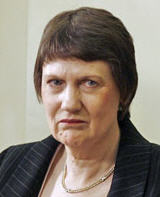|
The |
|
|
|
|
|
Christchurch ZB
John Dunne: Now the criminal procedure bill and this double jeopardy issue, essentially this is under the proposed legislation. Defendants of an earlier criminal trial could be charged again if new and compelling evidence unavailable after the first trial emerged after a not guilty verdict.† Therefore it would follow I would imagine that compelling unavailable evidence that comes to light after a guilty verdict would result in a retrial and vigorous redress too.† If so where does this leave the likes of Peter Ellis for instance, in Christchurch? Helen Clark They already have mechanisms under the law, John. For example you have the ability to come forward and apply for a pardon, for example so I donít think thatís so much the issue. The issue has been the acquittal which then turns out to be tainted, and there was a case several years ago which motivated the government to look at law reform in this area where someone had been convicted and then not so long after the trial one of the witnesses who swore on oath that that person had been in a place where he wasnít and was instrumental in getting the acquittal, That person said ďI lied at the trialĒ.† Now there is no way that the person who had been on charge could be brought back before the court. So in the cases of a tainted acquittal you need a mechanism like this. John Dunne What about though in these cases of compelling unavailable evidence that comes to light after a guilty verdict. For instance, you only have to read Lynley Hoodís book on the Peter Ellis issue Helen Clark Well look I really think the juryís out on that one, but, what Iím saying is that there are mechanisms to go all the way to have your name cleared if evidence comes to light later which suggests that you shouldnít have been found guilty. John Dunne Is the jury really out on this one or is it a case that the parliament has put this in the too hard basket because of members both sides of the house with alleged personal interests in this case? Helen Clark No I donít believe so. Look, I know there is a strong lobby on this but at the end of the day itís been backwards and forwards, backwards and forwards in the court system. The point is there is a way of opening up that issue where you have what appears to be compelling evidence, you can go all the way to the Governor General on that and itís looked at extremely carefully. John Dunne Again I point to Lynley Hoodís book because you know, from an outsider looking in it beggars belief that the evidence that acquitted the women in this case [was] the same evidence that convicted Ellis. Helen Clark Well, thatís a point, but you see it has gone round and round and round the criminal justice system and never got to that conclusion. John Dunne Now Rob Muldoon pardoned Arthur Allan Thomas on the strength of the David Yallop book, didnít he? Helen Clark Well, I donít know because I was really not of a sufficiently [laughing] mature age to be taking an interest in it at the time. John Dunne Excuse me, Prime Minister, you are a very well read person Helen Clark Yes I am, but I have never read the David Yallop book. Iíve never looked at Muldoonís reason for it, and Iím sure that he would have acted on advice at the time coming from the Solicitor General. John Dunne Have you read the Lynley Hood book? Helen Clark No, Iíve never read the Lynley Hood book. John Dunne Would you think it a wise move to read it? Helen Clark No. No I wouldnít. Iím an extremely busy person.† I read as much as I can, but it doesnít extend to that. John Dunne It is nice to hear you. Thanks for your time here this morning. Helen Clark Thanks. John Dunne. That is our Prime Minister Helen Clark at ZB this morning, with John Dunne.†† Next we have Peter Ellis. Good morning. Peter Ellis. Good Morning John. John Dunne Your response to those comments? Peter Ellis. On the fact that Helen Clark has not read ďThe City PossessedĒ? John Dunne Well there are a range of observations there Peter Ellis. Well indeed there was but I can assure her that she actually has that book that my great Aunt and Uncle Gordon and Molly Souter actually sent her a copy not long before they died. So she actually has this copy of that and they sent several politicians that book. I thought it would have rather behoove her to read it. John Dunne Youíve written to the Parliament on this issue of double jeopardy since the Criminal Procedures Bill has highlighted this. What reaction have you had? Peter Ellis. Well at the moment the Maori Party has responded. I am still hoping to hear from the National Party and the Labour Party and all other major parties. John Dunne Because as it stands this notion of compelling evidence that has come to light after a guilty verdict is something that you would argue would play into your hands. Correct? Peter Ellis. Well, with the debunking of the Sir Thomas Eichelbaum report by Ross Francis in the Law Journal and the current new study done by Professor Harlene Hayne at the Otago University, yes I would. John Dunne You would claim that compelling enough evidence? Peter Ellis. Well considering Sir Thomas made very strong points about the Kelly Michaels case in America being a poor example of childrenís interviews and Harlene Hayneís case has shown that mine has been twice as bad. Yes I would. John Dunne Your legal counsel would support that? Peter Ellis. My legal counsel did put that before Rick Barker and he appears to have chosen not to take it. Heís sent me off to the Privy Council again which considering the Bain decision it seems a little unfair because they ought to know that the decision made at the Privy Council should remain in principle and that was that the judge should not be interfering what evidence goes before a jury. John Dunne What next for you, then? Peter Ellis. Well, Iím hoping that people are hearing what weíre saying. I would rather hope to hear that the Prime Minister might take a little time out to read ďThe City PossessedĒ, and I will be asking under the Official Information Act how Rick Barker came to making some of his decisions against Mrs Ablett Kerrís very well thought out letter to him. John Dunne Thanks for coming to the phone for us this morning. I appreciate that. Peter Ellis. Youíre most welcome John. John Dunne That is Peter Ellis. |



